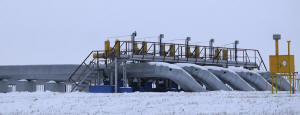The EU seeks to halt Russian gas imports by the end of 2027 and ban new
contracts already this year
[May 07, 2025] By
LORNE COOK and SAM McNEIL
BRUSSELS (AP) — The European Union should halt imports of Russian
natural gas by the end of 2027 to deprive President Vladimir Putin of
revenue that helps fuel his war on Ukraine, the bloc’s executive branch
said Tuesday.
Under a detailed plan to be presented next month, the European
Commission would seek to ban new gas contracts with Russia by the end of
this year and phase out existing ones still in use in the 27-nation EU
by the end of 2027.
“Putin has shown that he doesn’t mind weaponizing gas,” EU Energy
Commissioner Dan Jørgensen said as he outlined the plan. “We do not want
to fill up his war chest and support his war economy because who knows
which countries will be next.”
Jørgensen said the EU had completely cut coal purchases from Russia and
drastically lowered oil and gas imports since the war on Ukraine began
in 2022, but that 1.8 billion euros ($2 billion) in energy revenue still
reached Moscow every month last year.

“I am a little bit embarrassed that last year we still paid 23 billion
euros ($26 billion) to Russia whilst they are in war with our friends in
Ukraine,” Jørgensen told reporters in Strasbourg, France.
The EU says it has cut gas imports from 45% to 19%, and oil from 27% to
3%, of its prewar levels. But that still makes it Russia’s biggest gas
client, with pipelines in operation across the Black Sea, Belarus, and
Turkey, according to the Energy and Clean Air think tank.
Ten countries continue to import energy from Russia. Those that still
take its gas via pipelines include Greece, Hungary and Slovakia.
Austria, Poland and the Baltic countries – Estonia, Latvia and Lithuania
– have phased out their imports.
[to top of second column] |

The gas pumping station at Sudzhe, Russia, seen on Jan. 11, 2009.
(AP Photo/Sergei Chuzavkov, file)
 Hungary and Slovakia – whose leaders
are considered to be Putin’s closest allies in Europe – have blocked
EU military assistance to Ukraine, and are sure to oppose the
commission’s gas plans.
However, the EU’s executive branch appears determined not to let
them veto the plan and is ready to propose a system that would only
have to be endorsed by about two-thirds of the 27 member countries,
and possibly by the European Parliament.
Jørgensen said that by the end of this year, each country would be
required to submit plans showing how they intend to stop imports of
Russian energy and that existing spot market contracts would be
banned, measures that would eliminate one-third of imports.
He conceded that the plan would face challenges but said that it
would be introduced “in a gradual, coordinated way,” with EU support
being provided if needed to those countries that are hardest hit.
“Russia is a threat to all of us. Therefore, we must act,” Jørgensen
said.
___
McNeil contributed to this report from Barcelona, Spain.
All contents © copyright 2025 Associated Press. All rights reserved
 |